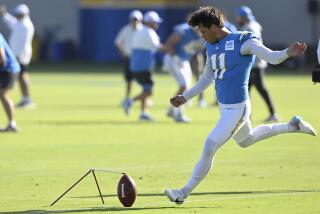On the Job Training
- Share via
GREENVILLE, S.C. — When Bobby Lamb took over as Furman’s head coach last season, he brought with him the well-worn, time-honored plan for football training camp he followed as a player and longtime assistant.
Now, Lamb -- and football coaches throughout the country -- can rip up those yellowed, dog-eared schedules.
Forget Bear Bryant’s Junction Boys. The NCAA has some new, more moderate summer practice guidelines that change everything done before.
Freshmen no longer come in and train days before the veterans. Teams practice just once a day their first five days as players handle academic and team duties. And when players finally put on the pads, gone will be consecutive days of two-a-day practices long a standard in college football.
South Carolina trainer Rod Walters believes the changes should eliminate the horrific incidents of heat-related injuries -- and sometimes deaths like Northwestern player Rashidi Wheeler two years ago -- at football camps.
“The most important thing is your rest,” Walters said. “You’ve got to make sure the body has adequate time to recover. This is going to help.”
Walters and the university sponsored a Heat Summit last week, giving area sports trainers and medical personnel updates on handling sometimes dangerous hot-weather training.
South Carolina high school teams began practice last Friday. Most state colleges report this week.
Lamb says Furman’s been running the same practice plans since the days of Dick Sheridan 25 years ago. So it’s been a struggle to alter something his coaches know like the back of their playbooks. “However, everybody who’s in football is having to do it,” Lamb said. “And that makes you feel a little bit better that you’re not the only ones scratching your heads.”
South Carolina Coach Lou Holtz wasn’t sure how he would handle the changes. “It’s had a tremendous impact,” said Holtz, who traditionally began teaching his newest players days before his upperclassmen arrived. “We’re all in uncharted waters.”
Clemson Coach Tommy Bowden worries newcomers won’t catch on to the faster-paced, college game as quickly. He says he thought about holding separate practices -- one for freshmen, and one for everyone else. “Some of the freshmen are going to be lost out there,” said Bowden, who is starting his fifth year with the Tigers. “It’s going to slow their progress.”
Coastal Carolina Coach David Bennett starts his school’s first-ever football camp on Aug. 6. He thought the new rules would give players a chance “to get two good meals in them” before returning to a hot, searing field to hit tackling sleds or chase punts.
Heat stress is commonly seen on football fields through weight loss and muscle cramps. Leslie Bonci, director of sports nutrition at the University of Pittsburgh Medical Center, says she has seen athletes who’ve lost as much as 14 pounds during a training session. When a player is dehydrated, their core temperature can rise leading to cramping and in extreme cases, blacking out or worse.
Besides keeping athletes healthier, the guidelines should keep them fresher during football season as well, Bonci said.
“Coaches say, ‘You’ve got to do it, you’ve got to really work hard.’ By the time you get to the middle of the season, you have whupped athletes,” she said. “Instead, if you give them a chance to kind of acclimatize and really, really make the most of their practices instead of overloading them, you’re going to have athletes extend their season.”
Walters says Holtz always has kept players’ health in mind. The Gamecocks keep large fans blowing cool air on the side, along with a cooling tent that mists players who could be overheating. The team has practiced early before the sun blazes and at night under the practice field lights. And trainers are continually loading players with fluids before, during and after sessions, Walters said.
South Carolina tight end Hart Turner doesn’t expect Holtz and his staff to lighten up on players when training camp opens. Turner says the hard two-a-day sessions have helped teams in the past, but “I guess players have taken some risks before. This might stop that.”
Football-wise, Lamb says the Furman staff should get to break down completely one practice film and point out mistakes before the next session comes up. In the past, the Paladins held 10 practices during one five-day stretch. “That made it a mad scramble to finish one before you started the other,” Lamb said.
But five days with only one practice a day mean Lamb must bring the team to campus earlier, pinching his budget. He hasn’t figured out how much extra that means. “Right now, it’s costing me six more meals and two more nights for 90 guys,” he said. “You do the math.”
More to Read
Go beyond the scoreboard
Get the latest on L.A.'s teams in the daily Sports Report newsletter.
You may occasionally receive promotional content from the Los Angeles Times.










